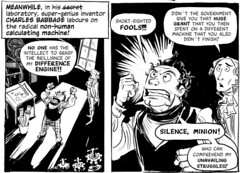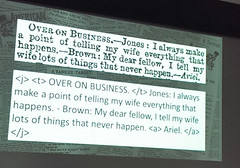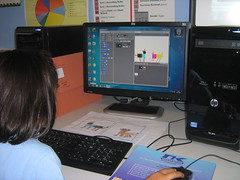 Someone told me of a Twitter exchange that took place a few weeks ago in which teachers were saying that their kids found Scratch boring. Well (he says, arms akimbo), here are my views on that.
Someone told me of a Twitter exchange that took place a few weeks ago in which teachers were saying that their kids found Scratch boring. Well (he says, arms akimbo), here are my views on that.Spreadsheets: vindicated at last!
 I’ve long been an ardent advocate of spreadsheets. They can be an invaluable tool in business, education or any other field in which planning, cost or both are paramount. As far as Computing and ICT is concerned, they can be used for teaching modelling and computational thinking. However, they have been denigrated as being “just” an office tool, far removed from the exciting world of coding or robotics.
I’ve long been an ardent advocate of spreadsheets. They can be an invaluable tool in business, education or any other field in which planning, cost or both are paramount. As far as Computing and ICT is concerned, they can be used for teaching modelling and computational thinking. However, they have been denigrated as being “just” an office tool, far removed from the exciting world of coding or robotics.6 Ideas for teaching the Computing curriculum
 I thought these posts from the archives might be interesting: 6 ideas for teaching the Computing curriculum. Unfortunately, being mathematically challenged, I originally inadvertently designated two of them as “#2”. That’s why I never became a maths teacher. However, I have since renumbered them, so they start at zero, which is, computationally speaking, a pretty good thing to do. Anyway, although the series refers to the “forthcoming Computing curriculum”, the ideas themselves are still useful I believe. I hope you agree.
I thought these posts from the archives might be interesting: 6 ideas for teaching the Computing curriculum. Unfortunately, being mathematically challenged, I originally inadvertently designated two of them as “#2”. That’s why I never became a maths teacher. However, I have since renumbered them, so they start at zero, which is, computationally speaking, a pretty good thing to do. Anyway, although the series refers to the “forthcoming Computing curriculum”, the ideas themselves are still useful I believe. I hope you agree.The Thrilling Adventures of Lovelace and Babbage: The Book
 If, like me, you enjoy reading comics and graphic novels, and are interested in Computing, you may already be familiar with the blog called 2D Goggles Or The Thrilling Adventures of Lovelace and Babbage. This relates the story of the development of the Difference Engine and other aspects of the lives of Ada Lovelace and Charles Babbage. Their adventures are based on (mostly) real events and episodes, with a lot of poetic licence thrown in! I thoroughly recommend reading the adventures, and I suggest encouraging your students to do so too. It will help them learn about the development of computing and computer programming in an enjoyable way.
If, like me, you enjoy reading comics and graphic novels, and are interested in Computing, you may already be familiar with the blog called 2D Goggles Or The Thrilling Adventures of Lovelace and Babbage. This relates the story of the development of the Difference Engine and other aspects of the lives of Ada Lovelace and Charles Babbage. Their adventures are based on (mostly) real events and episodes, with a lot of poetic licence thrown in! I thoroughly recommend reading the adventures, and I suggest encouraging your students to do so too. It will help them learn about the development of computing and computer programming in an enjoyable way.Why you should collaborate on a Computing scheme of work
 At the end of the article 7 Characteristics of a good Computing Scheme of Work I said that people should work with other people on their Computing scheme of work. Why?
At the end of the article 7 Characteristics of a good Computing Scheme of Work I said that people should work with other people on their Computing scheme of work. Why?Taking stock of the new Computer curriculum: 5 key questions
 Now that the new Computing curriculum in England has been running for nearly a term, it's a great time to stand back and take stock. Actually, I recommend doing that even if you are not in England and/or have not needed to change anything. Here's a list of 5 questions you might care to ask yourself:
Now that the new Computing curriculum in England has been running for nearly a term, it's a great time to stand back and take stock. Actually, I recommend doing that even if you are not in England and/or have not needed to change anything. Here's a list of 5 questions you might care to ask yourself:My Informatics scheme of work part 1
 I thought it would be interesting to dig out my scheme of work for Information Technology – as it was then then – from 1997. It was based on the Informatics scheme of work published by the now defunct organisation Acitt. Acitt was a subject association for ICT Co-ordinators. I helped to shape the Acitt scheme of work, but the one I used myself was a variation, adjusted to meet the circumstances pertaining to my school. I’ve reproduced it below.
I thought it would be interesting to dig out my scheme of work for Information Technology – as it was then then – from 1997. It was based on the Informatics scheme of work published by the now defunct organisation Acitt. Acitt was a subject association for ICT Co-ordinators. I helped to shape the Acitt scheme of work, but the one I used myself was a variation, adjusted to meet the circumstances pertaining to my school. I’ve reproduced it below.How learning to code might improve writing skills
Hour of Code–this week!
 The Hour of Code allows anyone to try out coding for the first time by teaching the basics of computer programming in just sixty minutes.
The Hour of Code allows anyone to try out coding for the first time by teaching the basics of computer programming in just sixty minutes.When it comes to coding, how secure is your network?
 With a new Computing curriculum that focuses on students learning to code and writing simple programs it’s important for school ICT and Computing heads, teachers or those responsible for ICT/Computing to make sure their school network is secure and able to handle the new requirements without compromising the rest of the system.
With a new Computing curriculum that focuses on students learning to code and writing simple programs it’s important for school ICT and Computing heads, teachers or those responsible for ICT/Computing to make sure their school network is secure and able to handle the new requirements without compromising the rest of the system.
Here are a few considerations to help with that and make sure your data is safe and the students can enjoy exploring new learning securely.
Encouraging girls to do computing: an economics approach
3 reasons your kids are bored in Computing lessons, and 9 solutions
 Are your students yawning, checking their email, launching paper aeroplanes in your lessons? Perhaps you’re making one of these mistakes.
Are your students yawning, checking their email, launching paper aeroplanes in your lessons? Perhaps you’re making one of these mistakes.Ideas for the computing curriculum: #4 Fun and pointless? Why not?
 In this series I’m going to be making some suggestions, putting out some ideas. These are based on presentations I’ve given. I can think of how these ideas, or their implications, might be applied in the classroom. However, I think it better if I stand back and let you do that part of the work!
In this series I’m going to be making some suggestions, putting out some ideas. These are based on presentations I’ve given. I can think of how these ideas, or their implications, might be applied in the classroom. However, I think it better if I stand back and let you do that part of the work!New ideas for a new Computing curriculum
 I had the pleasure of attending one of the RM Technical seminars recently, and it was well worth the time. The event was divided into several strands. I chose the Curriculum and E-safety option rather than one of the more technical ones.
I had the pleasure of attending one of the RM Technical seminars recently, and it was well worth the time. The event was divided into several strands. I chose the Curriculum and E-safety option rather than one of the more technical ones.
As well as a very entertaining keynote lecture by Sir Ranulph Fiennes, there were three sessions:
The things you can do with data! Part 1
 I found it difficult to sleep last night. The reason is that I attended a symposium yesterday, and was exposed to so many new ideas that I’m having to do quite a bit of processing. Actually, that’s quite exciting. I often enjoy conferences, but rarely come away buzzing from them. Now, I normally wouldn’t write about a conference so soon after attending it, but I wanted to bring a few things to your attention straight away. I’m sure you’ll find them interesting in their own right (at least, I hope you do), and you may wish to discuss them with your students. It’s all part of my quest to show that computing and ICT can be interesting and enjoyable, and not just for geeks.
I found it difficult to sleep last night. The reason is that I attended a symposium yesterday, and was exposed to so many new ideas that I’m having to do quite a bit of processing. Actually, that’s quite exciting. I often enjoy conferences, but rarely come away buzzing from them. Now, I normally wouldn’t write about a conference so soon after attending it, but I wanted to bring a few things to your attention straight away. I’m sure you’ll find them interesting in their own right (at least, I hope you do), and you may wish to discuss them with your students. It’s all part of my quest to show that computing and ICT can be interesting and enjoyable, and not just for geeks.How can teachers get to grips with computer programming, and where do we start? By Lawrence Williams
 Many teachers have been utterly dismayed by the seemingly impossible demands of the new Programmes of Study for Computing. How can we all suddenly develop a wide range of new skills in Computing? Can our pupils, aged from only 5 years, really understand, write, and debug computer programmes? It seems an impossible task. But help is at hand…. And from a teacher of English, with no Computing training! (Though with some experience in using ICT.)
Many teachers have been utterly dismayed by the seemingly impossible demands of the new Programmes of Study for Computing. How can we all suddenly develop a wide range of new skills in Computing? Can our pupils, aged from only 5 years, really understand, write, and debug computer programmes? It seems an impossible task. But help is at hand…. And from a teacher of English, with no Computing training! (Though with some experience in using ICT.)
Lawrence Williams explains.
My Top 5 Programming Apps, By Adam Foster
 If your students use iPads in lessons, what apps could you use in order to help them learn programming? In this article, Adam Foster, aka @iPadTeachers, describes his top 5 apps and how he selected them.
If your students use iPads in lessons, what apps could you use in order to help them learn programming? In this article, Adam Foster, aka @iPadTeachers, describes his top 5 apps and how he selected them.Assessing project-based learning in Computing
The Computing Curriculum: Suffolk's Interpretation
 Kathryn Day describes how she and her colleagues have approached the teaching of the Computing Programme of Study in Suffolk, England.
Kathryn Day describes how she and her colleagues have approached the teaching of the Computing Programme of Study in Suffolk, England.Ideas for the computing curriculum: #3 Be self-referential
 In this series I’m going to be making some suggestions, putting out some ideas. These are based on presentations I’ve given. I can think of how these ideas, or their implications, might be applied in the classroom. However, I think it better if I stand back and let you do that part of the work!
In this series I’m going to be making some suggestions, putting out some ideas. These are based on presentations I’ve given. I can think of how these ideas, or their implications, might be applied in the classroom. However, I think it better if I stand back and let you do that part of the work!
I know that this is counterintuitive, but what if you devised an activity to teach programming or computational thinking, but instead of of just telling the kids what to do, you make them solve a problem first – by applying computational thinking or some elementary programming?

